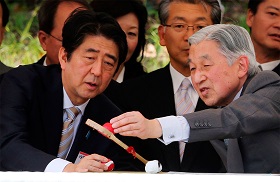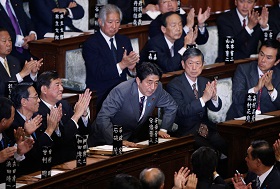On July 13, 2016 major Japanese media reported that Emperor Akihito had privately expressed a wish to abdicate the throne in the next few years. What followed was a storm of mostly sympathetic media commentary focusing on the monarch's deteriorating health and advanced age. Yet accommodating Akihito's wish may pose a host of legal problems as abdication is not recognized by Japanese law. Moreover, changing Japanese legislation following the monarch's plea for abdication may be considered unconstitutional and present the government with a legal dilemma.
On July 13, 2016 major Japanese media reported that Emperor Akihito had privately expressed a wish to abdicate the throne in the next few years. What followed was a storm of mostly sympathetic media commentary focusing on the monarch's deteriorating health and advanced age. Yet accommodating Akihito's wish may pose a host of legal problems as abdication is not recognized by Japanese law. Moreover, changing Japanese legislation following the monarch's plea for abdication may be considered unconstitutional and present the government with a legal dilemma.
Akihito, the reigning Japanese emperor, was spending the evening of July 13 at his imperial villa in Hayama, a small, quiet town on the Pacific Ocean seaside. Yet this same evening witnessed a media storm in Tokyo as NHK, Japan's national broadcasting organization, reported that the monarch had disclosed his intention to abdicate in the next few years in favor of the crown prince to unnamed officials at the Imperial Household Agency. The Agency's vice-grand steward hastened to publicly dispel the rumor in an interview later that night, but some Japanese media believe this was just a tactical move to buy time. Indeed, the ultra-conservative Agency, as well as the whole political establishment in Tokyo, will need time to mull their next steps as the seemingly innocuous supplication by the frail Akihito to let him retire while he still can may very well present Japan with an unprecedented constitutional dilemma.
No Country for Old Men
In its original report, NHK linked the emperor's alleged decision to retire with his advanced age and failing health. The 82-year-old monarch himself admitted in a recent interview that he had "become increasingly aware of his age and even allowed mistakes in the performance of [his] public duties." In the early 2000s, Akihito was treated for prostate cancer and underwent a successful coronary artery bypass surgery in 2012. While his hearing and eyesight deteriorated significantly enough to interfere with his daily work, the emperor nonetheless continued to perform his numerous public duties. Akihito reportedly believes that only a person who can satisfactorily fulfill the emperor's constitutional responsibilities should occupy the throne, which sheds extra light on his desire to pass the mantle to the much younger crown prince.
Some media report that Akihito first considered abdication as early as a few years ago. The conservative Sankei Shimbun believes he may have shared his thoughts with immediate family during one of the monthly lunches with the empress and Princes Naruhito and Fumihito (they are reported to have “accepted” his decision). An unnamed Imperial Household Agency official told NHK that "considering his position as the national symbol, His Majesty refrained from expressing his intention directly before, but this time his feelings must have found a way out." According to NHK, Akihito is now preparing to make his wishes public.
Rumors of Emperor Akihito’s abdication have been denied by the Imperial Household Agency. Vice-Grand Steward Yamamoto Shinichiro, the Agency’s ‘number two,’ went so far as to hold an hour-long press conference to refute NHK's allegations. "None of the facts reported have actually taken place," said Yamamoto also adding that the Agency was not considering the option of allowing the emperor to abdicate since "His Majesty has not expressed any such feelings." Despite these denials, Japanese media are following this news with keen attention—the Imperial Household Agency is notorious for its conservatism and dislike of publicity, so expecting it to promptly acknowledge such a controversial fact would be unreasonable The controversy is quite understandable, too: the contemporary Japanese legal system has no mechanism for abdication and the very discussion of it may challenge the constitutional foundations of the nation.
From Antiquity with Love
In pre-modern Japan, abdication was 'business as usual.' Nearly half of Japanese sovereigns—both actual and legendary—are known to have stepped down from the Chrysanthemum Throne. Paradoxically, quite a few did so not to retire and enjoy the pleasures of private life, but to increase their power—in medieval Japan, the monarch was so constrained by ritual and religious taboos that the Mikados of old found it far easier to rule from retirement than from the court. The last case of abdication took place in 1817 when Emperor Kokaku abdicated in favor of his son, who then became known as Emperor Ninko.
The practice remained regulated by convention until it was implicitly outlawed by the 1889 Imperial Household Law (originally conceived as a set of private regulations for the imperial family), which made no mention of abdication. Nikkei's veteran journalist Ryo Inoue argues that by striking abdication from the list of the monarch's powers, the architects of modern Japan sought to guard against dilution of the emperor's absolute authority and prestige. Mindful of the political disunity of pre-modern and early modern Japan, they believed that just as there cannot be two suns in the sky, there cannot be two sovereigns over the people—even if one of them is actually retired.
Inoue believes that even after the Japanese monarchy became a purely ceremonial institution following Japan's defeat in World War II, the government chose not to mention abdication in the current Imperial Household Law of 1947 since it was closely connected with the issue of then-Emperor Hirohito's war responsibility. The Law has remained unchanged ever since and is currently the basic legal act governing the affairs of the imperial family. Its language on imperial succession is unequivocal: "Upon the demise of the Emperor, the Imperial Heir shall immediately accede to the Throne." This wording means that under today's Japanese legislation, there are no legal ways for the emperor to pass the throne to someone else except for... passing away.
Constitution at Stake?
To accommodate the emperor’s wish to abdicate, one of two things has to happen: one option is to amend the Imperial Household Law to lay down the legal groundwork for abdication. The other is to have the Diet pass a special ad-hoc bill permitting Akihito to step down just this once. In either case, changing the existing legislation would be involved and that is precisely what makes the issue so controversial: according to the Japanese constitution, the emperor has no "powers related to government," so re-writing or passing a law at his behest may be viewed as a violation of the constitution.
Different from some of his august European counterparts, the Japanese emperor's position is purely ceremonial. According to the constitution, he has no 'reserve powers' whatsoever and may act only on the advice and approval of the Cabinet with the latter being legally responsible for any such action. A public expression of the emperor's desire to abdicate may, therefore, be interpreted as unconstitutional, and some conservative commentators in Japan have a hard time believing Akihito expected his wishes to be leaked when expressing them privately. "The fact that the person(s) who heard about this made this information public may become a constitutional problem... it may be the case that His Majesty did not wish for this to happen," said Tsuneyasu Takeda, a distant blood relative of Emperor Meiji and an active media personality.
Navigating this constitutional dilemma will be an uneasy task for the Japanese government. So far its reaction has been circumspect: at a July 15 press conference, Chief Cabinet Secretary Yoshihide Suga emphasized that the government was not considering making abdication legal. Deputy Prime Minister and Finance Minister Taro Aso went somewhat further by saying that the government will have to think of ways to deal with the heavy burden of official duties Akihito has to cope with at such an advanced age. In a somewhat surprising statement, leader of the opposition Democratic Party Katsuya Okada supported the monarch's wishes and called for establishing an expert working group to discuss the matter in detail.
It remains to be seen if the government will go so far as to amend the Imperial Household Law to allow Akihito to abdicate. Claims of unconstitutionality aside, such a decision is associated with a host of other problems: What will the retired emperor's status and title be? Who will perform traditional Shinto rites after he abdicates? How will his civil list be financed? All these questions will have to be answered before legislative action is taken. It will also be necessary to work out a legal mechanism to prevent arbitrary or unreasonable abdications—a challenging task indeed. Given these difficulties, the government is more likely to look for other ways to make the elderly monarch's life easier, such as reducing the burden of official duties he is required to fulfill or devising an elaborate system of regency.
When thinking about this problem, it is also important to bear in mind that ever since Prime Minister Shinzo Abe came to power in 2012, Japanese society has been abuzz with talk of constitutional reform. Many believe that the prime minister has launched an assault against the constitution, which remains a symbol of Japanese democracy and peaceful foreign policy. When the ruling Liberal Democratic Party jammed a package of national security laws radically expanding the Self-Defense Forces' mandate through the Diet in 2015, critics thought the constitution was under attack. Now that the ruling coalition has secured a constitutional majority in both houses of the Diet, the prime minister and his Cabinet must be extremely careful in dealing with sensitive constitutional matters—including the abdication issue—in order not to set off another wave of public criticism.
Amid all this uncertainty, Emperor Akihito returned to his official residence from the imperial villa in Hayama on July 14, 2016, to resume work on the same day. Pundits will eye his every move from now on, waiting for an official statement from the monarch himself. While we can only guess how the government will deal with this situation, one thing is clear: considering the immense respect the emperor commands over Japanese society and in the political establishment, measures to assuage the daily struggles of the 82-year-old Akihito are sure to follow.






